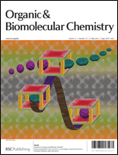
ORGANIC & BIOMOLECULAR CHEMISTRY
Scope & Guideline
Unveiling the complexities of biochemistry and organic chemistry.
Introduction
Aims and Scopes
- Organic Synthesis:
The journal highlights innovative synthetic methodologies for constructing complex organic molecules, including multi-step synthesis and one-pot reactions. - Catalysis:
Research on various catalytic systems, including transition metals, organocatalysts, and photocatalysts, is prominent, showcasing their roles in facilitating organic transformations. - Biomolecular Chemistry:
The intersection of organic chemistry with biological sciences is explored, focusing on the synthesis of biologically active compounds, drug discovery, and biomolecular interactions. - Green Chemistry:
Sustainable practices in organic synthesis are emphasized, including the use of environmentally friendly solvents, reagents, and methodologies aimed at reducing waste and energy consumption. - Mechanistic Studies:
The journal publishes articles that investigate the mechanisms of organic reactions, providing insights into reaction pathways and the development of new catalytic processes. - Computational Chemistry:
Computational studies that complement experimental work are included, aiding in the understanding of reaction mechanisms and the design of new molecules.
Trending and Emerging
- Photocatalysis:
There has been a significant increase in research focused on photocatalytic reactions, particularly those utilizing visible light, showcasing the potential for green chemistry applications. - Electrochemistry:
Electrochemical methods are emerging as a key area of interest, with an increasing number of publications exploring their application in organic synthesis and functionalization. - Multicomponent Reactions:
The popularity of multicomponent reactions is rising, with researchers seeking efficient and versatile synthetic routes that allow for the rapid assembly of complex molecules. - Sustainable and Green Chemistry:
A strong emphasis on sustainability is evident, with an increasing number of studies aimed at reducing environmental impact through innovative and eco-friendly synthetic methodologies. - Bioorthogonal Chemistry:
Research on bioorthogonal reactions is gaining momentum, particularly in the context of drug delivery and molecular imaging, reflecting the growing intersection of organic chemistry with biological applications. - Chiral Catalysis:
The development of new chiral catalysts and methodologies for asymmetric synthesis is trending, with an emphasis on achieving high enantiomeric purity and efficiency.
Declining or Waning
- Classical Organic Reactions:
Traditional methods of organic synthesis, such as classical Friedel-Crafts reactions and basic substitution reactions, appear less frequently as researchers explore more innovative and efficient methodologies. - Single-Method Studies:
There is a shift away from studies focusing solely on a single synthetic method or reaction type, favoring more comprehensive approaches that integrate multiple strategies. - Low-Impact Solvent Use:
Research emphasizing the use of low-impact solvents has decreased as more sustainable and innovative solvent systems gain traction in the scientific community. - Conventional Catalysts:
The focus on conventional catalysts, particularly noble metals, has waned in favor of exploring non-noble metal catalysts and organocatalysts that offer improved sustainability.
Similar Journals

EUROPEAN JOURNAL OF ORGANIC CHEMISTRY
Catalyzing Knowledge in Organic and Physical ChemistryThe EUROPEAN JOURNAL OF ORGANIC CHEMISTRY (ISSN: 1434-193X; E-ISSN: 1099-0690), published by WILEY-V C H VERLAG GMBH in Germany, stands as a crucial platform for disseminating innovative research in the fields of organic, physical, and theoretical chemistry. With its inception dating back to 1998 and converging expertise until 2024, this esteemed journal has achieved a notable reputation, earning a Q2 rank in both Organic Chemistry and Physical and Theoretical Chemistry categories as of 2023, indicating its vital contribution to the academic community. Researchers and professionals will benefit from its rigorous peer-reviewed articles, which foster advancement in chemical sciences, while students can leverage its wealth of knowledge to enhance their learning. Although currently not an open-access journal, the content produced is invaluable for those looking to stay at the forefront of chemical research.

Nature Reviews Chemistry
Elevating Insights in Contemporary ChemistryNature Reviews Chemistry is a premier journal published by NATURE PORTFOLIO, dedicated to advancing scholarly discourse in the broad field of chemistry. With an impressive impact factor and a ranking in the 99th percentile across its categories—ranked #2 in General Chemical Engineering and #4 in General Chemistry according to Scopus—this journal is recognized for its high-quality, peer-reviewed articles that synthesize and analyze the latest advancements in chemical research. Operating under a convergence framework from 2017 to 2024, Nature Reviews Chemistry aims to provide comprehensive insights and critical examinations of contemporary chemical practices, thereby reinforcing its status as a vital resource for researchers, professionals, and students alike. Although it is not an open-access journal, the breadth and authority of its content make it essential for those looking to stay at the forefront of chemical sciences.
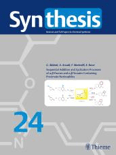
SYNTHESIS-STUTTGART
Advancing the Frontiers of Organic Chemistry and Catalysis.SYNTHESIS-STUTTGART
Published by the esteemed Georg Thieme Verlag KG, SYNTHESIS-STUTTGART stands as a vital resource in the field of Chemistry, specifically focusing on Organic Chemistry and Catalysis. With an impressive publication history dating back to 1970 and continuing through 2024, it serves as a platform for innovative research and developments in synthetic methodologies and their applications. The journal holds a significant impact factor, reflecting its influence within the academic community, and is recognized in the Scopus rankings as a reputable source in its categories, with a rank of #99/211 in Organic Chemistry and #43/68 in Catalysis. Researchers, professionals, and students alike can benefit greatly from its content, which upholds rigorous peer-review standards and contributes to the global discourse in these critical scientific domains.

CHINESE JOURNAL OF ORGANIC CHEMISTRY
Exploring the Frontiers of Organic CompoundsThe Chinese Journal of Organic Chemistry, published by Science Press, serves as a pivotal platform for advancing the field of organic chemistry since its inception in 1996. With an ISSN of 0253-2786, this esteemed journal provides robust scientific contributions, reflecting significant advancements and novel findings that are crucial to the organic chemistry community. As of 2023, it is categorized in the Q3 quartile of organic chemistry journals, positioning it within the competitive landscape of this vibrant research area, ranking #147 out of 211 in Scopus, corresponding to a 30th percentile ranking. The journal is committed to fostering a scholarly exchange of ideas and research, making it an essential resource for researchers, professionals, and students dedicated to exploring the complexities and applications of organic compounds. The Chinese Journal of Organic Chemistry continues to support the dissemination of high-quality research that contributes to both local and global scientific endeavors.

Mini-Reviews in Organic Chemistry
Exploring the Frontiers of Organic Chemistry.Mini-Reviews in Organic Chemistry, published by Bentham Science Publishers, is an esteemed journal in the field of organic chemistry, dedicated to presenting concise, thoughtful reviews that encapsulate the rapid advancements in this dynamic area of study. Since its inception in 2005, the journal has become a valuable resource for researchers, professionals, and students interested in the latest developments and trends, featuring an HIndex indicative of its scholarly impact. With its 2023 Scopus ranking placing it in the 52nd percentile and categorized as Q3 in Organic Chemistry, it offers insights that bridge the gap between fundamental research and practical applications. While not an open-access journal, it provides significant access options for institutional journals and library systems. Situated in the United Arab Emirates, Mini-Reviews in Organic Chemistry continues to serve as a beacon for innovation and knowledge dissemination in organic chemistry, ensuring that its audience remains at the forefront of scientific discovery.

ARKIVOC
Exploring the Frontiers of Organic Chemistry TogetherARKIVOC is an esteemed open-access journal dedicated to the field of Organic Chemistry, published by ARKAT USA INC. Since its inception in 2000, ARKIVOC has aimed to disseminate high-quality research and advancements in organic chemistry, fostering an international exchange of knowledge within this ever-evolving discipline. With its ISSN 1551-7004 and E-ISSN 1551-7012, the journal is committed to providing accessible content free of charge to researchers, students, and professionals around the globe. Although currently categorized in the fourth quartile of Organic Chemistry with a Scopus rank of #188 out of 211, ARKIVOC continues to encourage the publication of innovative works and critical reviews that highlight emerging trends and methodologies in organic synthesis, reaction mechanisms, and material sciences. Its open-access model since 2000 ensures that valuable contributions to scientific knowledge are widely available, promoting collaboration and discovery. The journal is based in the United States, with its editorial office located at the University of Florida, under the guidance of prominent chemists. ARKIVOC provides an essential platform for those deeply engaged in organic chemistry research, supporting the advancement of science for future generations.

RUSSIAN CHEMICAL BULLETIN
Your Gateway to Innovative Chemical Research.RUSSIAN CHEMICAL BULLETIN, published by SPRINGER, serves as a pivotal resource in the field of general chemistry, covering a wide array of topics that impact both theoretical and applied chemistry. With an ISSN of 1066-5285 and a presence since 1993, this journal provides a platform for disseminating significant research findings, practical applications, and novel methodologies within the broader chemistry community. While it currently holds a Q3 ranking in the Chemistry (miscellaneous) category and occupies the 230th position out of 408 in the Scopus rankings, its reputation continues to grow, fostering collaboration and innovation among researchers and professionals alike. Although the journal does not offer an open-access model, it is committed to making findings accessible within the academic community, ensuring that valuable insights can inform future research. With an anticipated convergence of studies extending to 2024, the RUSSIAN CHEMICAL BULLETIN remains an essential reference for those dedicated to advancing chemical science.
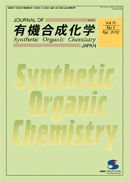
JOURNAL OF SYNTHETIC ORGANIC CHEMISTRY JAPAN
Unveiling the complexities of synthetic organic processes.JOURNAL OF SYNTHETIC ORGANIC CHEMISTRY JAPAN, published by the SOCIETY OF SYNTHETIC ORGANIC CHEMISTRY, JAPAN, is an esteemed publication specializing in the dynamic field of organic chemistry. With a rich history dating back to 1944, this journal aims to disseminate pivotal research findings and innovative methodologies in synthetic organic chemistry, fostering collaboration and knowledge exchange among researchers and professionals. Although it currently holds a modest ranking in the Q4 quartile for organic chemistry, its commitment to advancing the discipline remains steadfast. The journal primarily caters to scholars and students seeking to delve deeper into organic synthesis, highlighting original articles, reviews, and methodological studies. While access to the journal is not open, its contributions to the field are essential for anyone invested in understanding the complexities of organic chemistry. We invite you to explore the journal's offerings and enhance your expertise in synthetic organic processes.
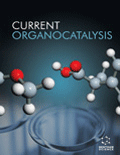
Current Organocatalysis
Exploring New Horizons in CatalysisCurrent Organocatalysis is a premier academic journal dedicated to the dynamic field of organocatalysis, published by Bentham Science Publishers, Ltd. Based in the United Arab Emirates, this journal has been a valuable resource for researchers since its inception in 2014 and will continue to publish impactful articles until 2024. The journal provides a platform for sharing groundbreaking research, reviews, and insights that significantly contribute to the fields of Analytical Chemistry, Catalysis, and Organic Chemistry. With a Q4 ranking in several chemistry categories, it identifies and disseminates emerging strategies and methodologies in organocatalysis, promoting collaboration and advancement in the community. While it operates on a subscription basis, the journal ensures accessible content for its audience to further supplement academic learning and professional development. Researchers, professionals, and students are encouraged to explore and contribute to this critical field, leveraging the journal as an essential resource for the latest trends and innovations in organocatalysis.
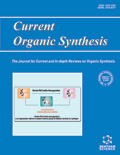
CURRENT ORGANIC SYNTHESIS
Catalyzing Innovation in Organic ChemistryCURRENT ORGANIC SYNTHESIS, published by Bentham Science Publishers Ltd, is a leading journal in the field of organic chemistry and biochemistry that serves as a vital platform for researchers and professionals advancing the synthesis of organic compounds. With an ISSN of 1570-1794 and an E-ISSN of 1875-6271, it boasts a significant impact within its category, ranked in the Q3 quartile for both biochemistry and organic chemistry as of 2023. The journal covers innovative research and reviews that enhance our understanding of organic synthesis methodologies, showcasing contributions that advance the field. Operating from Sharjah, United Arab Emirates, CURRENT ORGANIC SYNTHESIS has evolved since its inception in 2005, providing access to a wealth of information essential for students, professionals, and researchers alike. While it currently does not offer open access, the journal continues to maintain a strong community of scholars dedicated to fostering dialogue and innovation in the organic sciences.